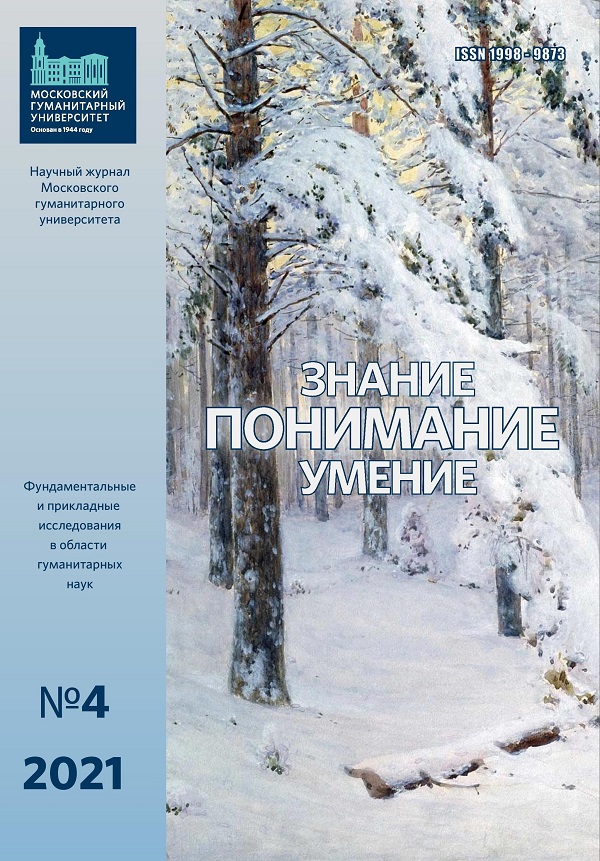Главная / Main Page / "Knowledge. Understanding. Skill" Journal / Contents / 2014 / No. 2
Ledyaev V. G., Ledyaeva O. M. Legitimacy and Force
(National Research University — Higher School of Economics, Moscow),
(Moscow State University of Civil Engineering)
Abstract ♦ In the liberal tradition legitimacy (legal authority) is usually explained as an outcome of people’s free and rational choice. However, our analysis allows us to conclude that quite often formally voluntary submission to political authority is based on particular forms of force and/or coercion.
The role of coercion (threat of force) in the “force-coercion” continuum and hidden forms of power basing on “the rule of anticipated reactions” is increasing. This limits the subject’s choice thereby decreasing the likelihood of alternative forms of social organization (regime) and enforcing the acceptance of the existing order through the increasing of costs and risks in case of a “wrong” choice. Therefore, political authority is accepted not (so much) as the outcome of free and rational choice, but as a result of the absence of real alternatives.
Thus, the process of legitimization of power (regime) in any society is extremely complex; in fact, there are quite different combinations and configurations of “legitimacies”, reflecting a wide spectrum of relations in modern society.
Keywords: legitimacy, political authority, power, force, coercion.
Ledyaev Valeri Georgievich, Doctor of Science (philosophy), PhD (University of Manchester, Department of Government), professor of the Department of Analysis of Social Institutions, National Research University — Higher School of Economics. Postal address: 20 Myasnitskaya St., Moscow, Russian Federation, 101000. Tel.: +7 (499) 152-09-31. E-mail:
valeri_ledyaev@mail.ru
Ledyaeva Olga Mikhailovna, Candidate of Science (philosophy), associate professor of the Philosophy Department, Moscow State University of Civil Engineering. Postal address: 26 Yaroslavskoe shosse, Moscow, Russian Federation, 109263. Tel.: +7 (495) 183-24-10. E-mail:
valeri_ledyaev@mail.ru

Citation: Ledyaev V. G. and Ledyaeva O. M. (2014) Legitimacy and Force. Znanie. Ponimanie. Umenie, no. 2, pp. 11–18. (Russ.).
RUSSIAN VERSION
REFERENCES
Hobbes, T. (2001) Leviafan [Leviathan]. Moscow, Mysl' Publ. 478 p. (In Russ.).
Ledyaev, V. G. (2000) Formy vlasti: tipologicheskii analiz [Forms of Power: A Typological Analysis]. Polis, no. 2, pp. 6–18. (In Russ.).
Machiavelli, N. (1999) Gosudar' [The Prince]. Minsk, Sovremennyi literator Publ. 704 p. (In Russ.).
Bachrach, P. and Baratz, M. S. (1962) Two Faces of Power. American Political Science Review, vol. 56, no. 4, pp. 947–952.
Bachrach, P. and Baratz, M. S. (1963) Decisions and Nondecisions: An Analytical Framework. American Political Science Review, vol. 57, no. 3, pp. 632–642.
Clegg, S. R. and Haugaard, M. (2009) Discourse of Power. In: The Sage Handbook of Power / еd. by Stewart R. Clegg and Mark Haugaard. London, Sage. xii, 484 p. Pp. 400–466.
Collins, R. (1975) Conflict Sociology: Toward an Explanatory Science. New York, Academic Press. xi, 584 р.
Dahrendorf, R. (1959) Class and Class Conflict in Industrial Society. Stanford, CA, Stanford University Press. 336 p.
Flathman, R. (1995) Legitimacy. In: A Companion to Contemporary Political Philosophy / ed. by Robert E. Goodin. Oxford, Blackwell. xiii, 679 р. Pр. 527–533.
Friedrich, C. (1937) Constitutional Government and Politics: Nature and Development. New York, Harper and Brothers. xvi, 591 p.
Maleševic, S. (2009) Collective Violence and Power. In: The Sage Handbook of Power / ed. by Stewart R. Clegg and Mark Haugaard. London, Sage. xii, 484 р. Pр. 274–290.
McWilliams, W. C. (1970) On Violence and Legitimacy. The Yale Law Journal, vol. 79, no. 4, pp. 623–646.
Mills, C. W. (2000) The Power Elite / with a new afterword by Alan Wolfe. New York, Oxford University Press. 442 р.
Poggi, G. (2001) Forms of Power. Cambridge, Polity Press ; Malden, MA, Blackwell Publishers. viii, 230 p.
Ripstein, A. (2004) Authority and Coercion. Philosophy and Public Affairs, vol. 32, no. 1, pp. 2–35.
Wrong, D. H. (2002) Power: Its Forms, Bases, and Uses / with a new introduction by the author. 3rd edition. New Brunswick, NJ,Transaction Publishers. xxviii, 326 р.
|
|
 Вышел в свет
Вышел в свет
№4 журнала за 2021 г.
|
|
|
|